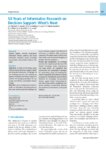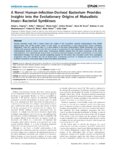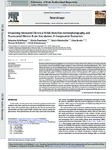Filters: Collection:"ir_uspace"
| Creator | Title | Description | Subject | Date | ||
|---|---|---|---|---|---|---|
| 76 |  | Olivera, Baldomero M.; Bulaj, Grzegorz | Structure of a novel P-superfamily spasmodic conotoxin reveals an inhibitory cystine knot motif | Conotoxin gm9a, a putative 27-residue polypeptide encoded by Conus gloriamaris, was recently identified as a homologue of the "spasmodic peptide", tx9a, isolated from the venom of the mollusk-hunting cone shell Conus textile (Lirazan, M. B., Hooper, D., Corpuz, G. P., Ramilo, C. A., Bandyopadhyay... | Conotoxins; P-superfamily spasmodic conotoxin; Cystine knot motif | 2002 |
| 77 |  | Mitchell, Joyce A. | Integrating historical clinical and financial data for pharmacological research | Background: Retrospective research requires longitudinal data, and repositories derived from electronic health records (EHR) can be sources of such data. With Health Information Technology for Economic and Clinical Health (HITECH) Act meaningful use provisions, many institutions are expected to adop... | 2011-01-01 | |
| 78 |  | Olivera, Baldomero M. | Novel venom peptides from the cone snail Conus pulicarius discovered through next-generation sequencing of its venom duct transcriptome | The venom peptides (i.e., conotoxins or conopeptides) that species in the genus Conus collectively produce are remarkably diverse, estimated to be around 50,000 to 140,000, but the pace of discovery and characterization of these peptides have been rather slow. To date, only a minor fraction have be... | 2012 | |
| 79 |  | Ogburn, Joyce L. | Report and commentary on the Faxon Institute: the second annual colloquium on scholarly communication issues | The development of electronic means of publishing has forever changed the face of authorship, publishing and library services. Contracts are on the rise, fair use is waning, and this shift in emphasis has profound implications. For effective and economical dissemination of scholarly information to s... | Electronic publishing; Libraries; Scholarly publishers | 1998 |
| 80 |  | Mitchell, Joyce A. | 50 Years of informatics research on decision support: what's next | Objectives: To reflect on the history, status, and future trends of decision support in health and biomedical informatics. To highlight the new challenges posed by the complexity and diversity of genomic and clinical domains. To examine the emerging paradigms for sup - porting cost-effective, person... | 2011-01-01 | |
| 81 |  | Dale, Colin | A novel human-infection-derived bacterium provides insights into the evolutionary origins of mutualistic insect-bacterial symbioses | Despite extensive study, little is known about the origins of the mutualistic bacterial endosymbionts that inhabit approximately 10% of the world's insects. In this study, we characterized a novel opportunistic human pathogen, designated ‘‘strain HS,'' and found that it is a close relative of th... | 2012-01-01 | |
| 82 |  | Baehr, Wolfgang | Annotation and analysis of 10,000 expressed sequence tags from 3 mouse eye cDNA libraries | BACKGROUND: As a biomarker of cellular activities, the transcriptome of a specific tissue or cell type during development and disease is of great biomedical interest. We have generated and analyzed 10,000 expressed sequence tags (ESTs) from three mouse eye tissue cDNA libraries: embryonic day 15.5 (... | Cluster Analysis; DNA, Complementary; Gene Expression Profiling | 2003 |
| 83 |  | Shapiro, Michael D. | Genetic architecture of skeletal convergence and sex determination in ninespine sticklebacks | The history of life offers plentiful examples of convergent evolution, the independent derivation of similar phenotypes in distinct lineages [1]. Convergent phenotypes among closely related lineages (frequently termed "parallel" evolution) are often assumed to result from changes in similar genes or... | Convergent evolution; Skeletal convergence; Pungitius pungitius; Gasterosteus aculeatus; Comparative genetics | 2009-07 |
| 84 |  | Bohs, Lynn A. | Phylogenetic relationships among the "spiny solanums" (Solanum subgenus Leptostemonum, Solanaceae) | Species of Solanum subgenus Leptostemonum comprise almost one third of the genus and are distributed worldwide. Members of this group are defined by their sharp epidermal prickles; thus, they are commonly referred to as the ˜spiny solanums." This subgenus includes a number of economically important... | Granule-bound starch synthase gene; GBSSI; Heterandry; ITS; Leptostemonum; Solanum; trnS-trnG; Waxy | 2006 |
| 85 |  | Olivera, Baldomero M. | Defining a clade by morphological, molecular, and toxinological criteria: distinctive forms related to Conus praecellens A. Adams, 1854 (Gastropoda: Conidae) | We carried out a definition of the Conus praecellens A. Adams, 1854, species group using a combination of comparative morphological data, molecular phylogeny based on standard genetic markers, and toxinological markers. Prior to this work, Conus praecellens was generally postulated to belong to a cl... | Turriconus; 12SrRNA sequences; Phylogenetic analysis; Conus praecellens; Exogenes | 2010 |
| 86 |  | Morrow, Anne; Tallie Casucci | Preserving and Disseminating Emerging Forms of Digital Scholarship in Academic and Research Libraries: The EDS Report | This report addresses challenges and offers recommendations to librarians, archivists, preservationists, and other information professionals seeking to archive and preserve emerging forms of digital scholarship. Our goal for the recommendations was, first and foremost, that they address known preser... | Digital scholarship; Libraries; Archives | 2019 |
| 87 |  | Moon, Anne M. | TBX3 regulates splicing in vivo: a novel molecular mechanism for Ulnar-Mammary Syndrome | TBX3 is a member of the T-box family of transcription factors with critical roles in development, oncogenesis, cell fate, and tissue homeostasis. TBX3 mutations in humans cause complex congenital malformations and Ulnar-mammary syndrome. Previous investigations into TBX3 function focused on its acti... | 2014-01-01 | |
| 88 |  | Bohs, Lynn A. | Three-gene phylogeny of the genus Solanum (Solanaceae) | Solanum, with approximately 1,500 species, is the largest genus in the Solanaceae and includes economically important species such as the tomato, potato, and eggplant. In part due to its large size and tropical center of diversity, resolving evolutionary relationships across Solanum as a whole has ... | ndhF; trnT-F; Waxy; Solanum; Cyphomandra | 2007 |
| 89 |  | Dannhauer, Moritz | Visualizing simulated electrical fields from electroencephalography and transcranial electric brain stimulation: a comparative evaluation | Electrical activity of neuronal populations is a crucial aspect of brain activity. This activity is not measured directly but recorded as electrical potential changes using head surface electrodes (electroencephalogram - EEG). Head surface electrodes can also be deployed to inject electrical current... | 2014-01-01 |
